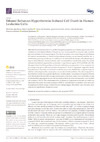Identificador persistente para citar o vincular este elemento:
https://accedacris.ulpgc.es/jspui/handle/10553/107237
| Título: | Ethanol enhances hyperthermia‐induced cell death in human leukemia cells | Autores/as: | Quintana, Mercedes Saavedra Díaz, Ester Gloria Del Rosario García, Henoc González, Ignacio Hernández González, Inmaculada Servanda Estévez Rosas, Francisco Jesús Quintana Aguiar, José Martín |
Clasificación UNESCO: | 32 Ciencias médicas 241003 Citología humana 2302 Bioquímica |
Palabras clave: | Ethanol Hyperthermia Leukemia cells Apoptosis HSP70 |
Fecha de publicación: | 2021 | Proyectos: | Evaluación de Endemismos Canarios Como Fuente de Biomoléculas de Interés Medico | Publicación seriada: | International Journal of Molecular Sciences | Resumen: | Ethanol has been shown to exhibit therapeutic properties as an ablative agent alone and in combination with thermal ablation. Ethanol may also increase sensitivity of cancer cells to certain physical and chemical antitumoral agents. The aim of our study was to assess the potential influence of nontoxic concentrations of ethanol on hyperthermia therapy, an antitumoral modality that is continuously growing and that can be combined with classical chemotherapy and radiotherapy to improve their efficiency. Human leukemia cells were included as a model in the study. The results indicated that ethanol augments the cytotoxicity of hyperthermia against U937 and HL60 cells. The therapeutic benefit of the hyperthermia/ethanol combination was associated with an increase in the percentage of apoptotic cells and activation of caspases-3, -8 and -9. Apoptosis triggered either by hyperthermia or hyperthermia/ethanol was almost completely abolished by a caspase-8 specific inhibitor, indicating that this caspase plays a main role in both conditions. The role of caspase-9 in hyperthermia treated cells acquired significance whether ethanol was present during hyperthermia since the alcohol enhanced Bid cleavage, translocation of Bax from cytosol to mitochondria, release of mitochondrial apoptogenic factors, and decreased of the levels of the anti-apoptotic factor myeloid cell leukemia-1 (Mcl-1). The enhancement effect of ethanol on hyperthermia-activated cell death was associated with a reduction in the expression of HSP70, a protein known to interfere in the activation of apoptosis at different stages. Collectively, our findings suggest that ethanol could be useful as an adjuvant in hyperthermia therapy for cancer. | URI: | https://accedacris.ulpgc.es/handle/10553/107237 | ISSN: | 1422-0067 | DOI: | 10.3390/ijms22094948 | Fuente: | International Journal of Molecular Sciences [ISSN 1422-0067], v. 22(9), 4948, (Mayo 2021) |
| Colección: | Artículos |
Citas SCOPUSTM
6
actualizado el 08-jun-2025
Citas de WEB OF SCIENCETM
Citations
7
actualizado el 22-feb-2026
Visitas
111
actualizado el 10-ene-2026
Descargas
71
actualizado el 10-ene-2026
Google ScholarTM
Verifica
Altmetric
Comparte
Exporta metadatos
Los elementos en ULPGC accedaCRIS están protegidos por derechos de autor con todos los derechos reservados, a menos que se indique lo contrario.
